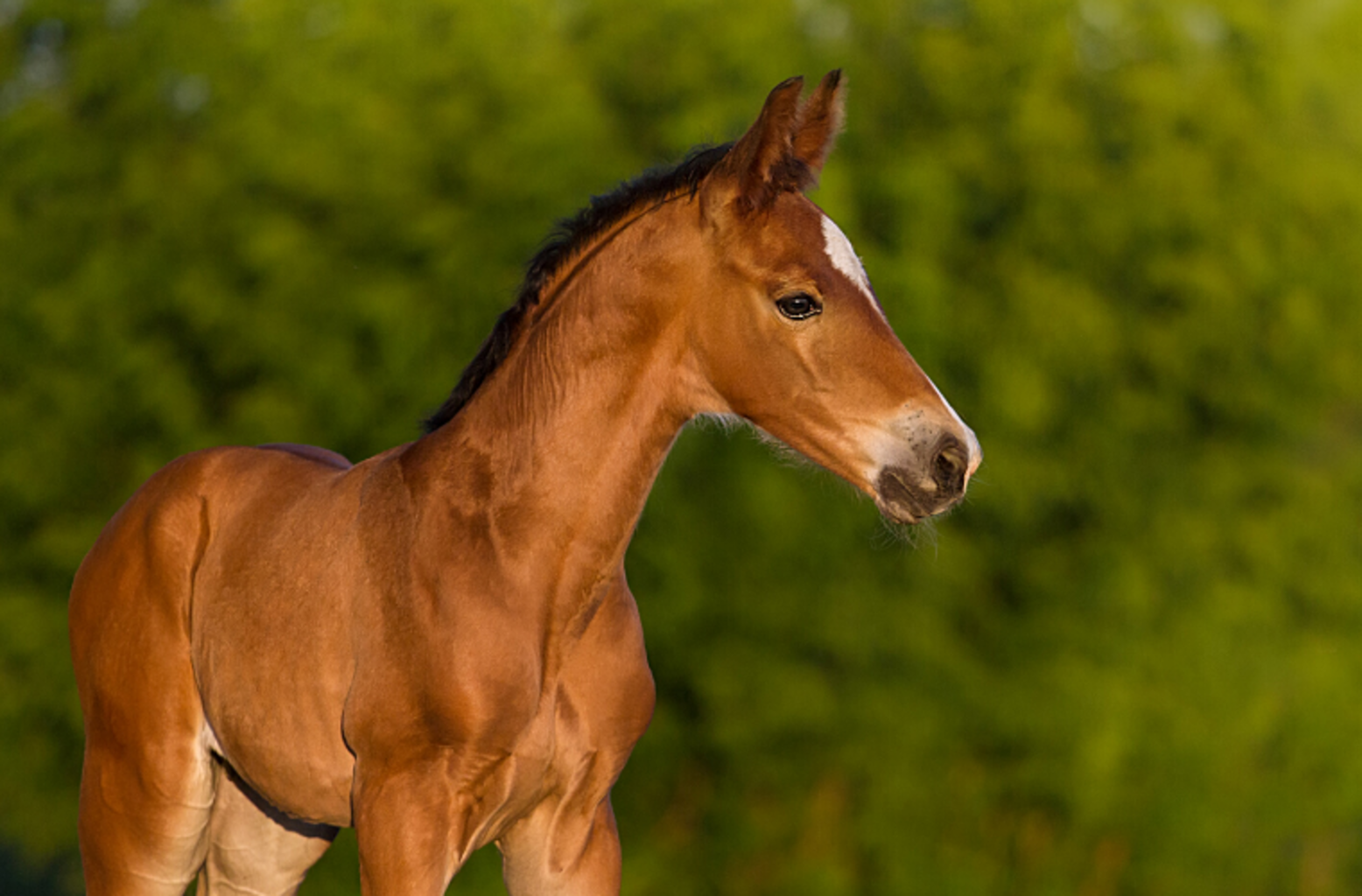For a healthy start in life
By Amelie Kokorsky
If you want to learn more about feeding horses, there are countless reports or books to broaden your knowledge. They deal with the most diverse diseases and special features of feeding. However, the focus of these texts is mostly on the adult sport or leisure horse. But what about young horses? How do you feed a small foal correctly? There is much less information available on this topic. With this article, we want to shed some light on the subject of feeding foals and weanlings.
When does feed intake in foals begin?
The first feed intake in foals actually starts very quickly and is in form of milk. Normally, the foal stands up shortly after birth and seeks the mare's udder. About 30-90 minutes after birth, the foal should have had its first drink from the mare. In most cases, the foal also instinctively follows the behaviour of seeking the udder. However, it can also happen that humans have to help a little because the foal either does not find the udder or the mare shows defensive reactions during the first drinking attempts.
For some mares, the sucking of the foal is an unfamiliar and somewhat unpleasant situation, so they try to keep the foal away from the udder by biting or hitting it. If this behaviour occurs, you can try to hold the mare by the halter and distract her a little while a helper slowly leads the foal to the udder. Of course, caution is always required here: Human and horse should not hurt each other. The mare usually realizes very quickly that sucking the foal is not unpleasant, but benefits both sides.
However, if the mare still shows defensive behaviour after several attempts, you should milk the mare by hand and give the foal the milk by bottle as soon as possible. The first feed intake in the form of the mare's milk is particularly important for the young foal. The first milk, the so-called "colostrum", contains many important vitamins, fats and above all the first antibodies to strengthen the foal's immune system as quickly as possible.
The birth process is very energy-consuming for a foal, so it needs new energy quickly after birth. The mare's milk will replenish the foal's energy reserves. In addition, the foal is born with a weak immune system and is very susceptible to any pathogens.
The colostrum contains a high proportion of antibodies, which are precisely adapted to the mare's environment and thus also to the foal's new environment. Before birth, it is therefore already important that the mare knows the place of birth. If the mare is to have her foal in a box, for example, the box should be thickly filled with bedding and there should be good stable hygiene. However, the hygiene measures should not be overdone either, because the mare should maintain a strong immune system and build up antibodies for the foal. You can re-bed the box daily and remove dung, but should refrain from using disinfectants or other sterile measures.
The foal's first feed intake therefore comes directly from the mare and is essential for the foal's development. The colostrum should not be supplemented or even replaced by other substitutes, even in the case of complications around the time of birth or even in the case of complications during suckling! No milk (substitute) product is as good as the first milk of a healthy mare!
With a normal course of events and good aftercare, the foal should be drinking milk at regular intervals after about 12 hours without any problems and should already be able to stand securely on its feet.
Of course, every feed intake also includes the dropping of faeces. The foal should defecate in small portions within the first 12 hours of feeding. The "meconium" has a firm to tough consistency and often comes after the first feed intake of colostrum.
A few figures for a good start into foal life:
- About 15 minutes after birth the foal starts its first attempts to stand up.
- 30 - 90 minutes after birth the foal seeks the mare's udder and takes in the vital colostrum.
- After 12 hours the milk intake should work without problems and the foal can follow the mare's first steps.
- A foal drinks quite frequently in the first days after birth, but in small amounts. 4 - 7 drinking attempts per hour are normal.
- The foal drinks about 150 - 200 ml per milk intake.
Of course, these are general indications that have to be considered very individually. For example, if the birth process was slow and therefore very strenuous for mare and foal, the first attempts to stand up may be somewhat delayed. If the mare is still young and has her first foal, the first milk intake may also be slower. It is important to give the mare and foal a lot of rest and patience in the first period. If the times differ greatly, a veterinarian should be consulted.

Do I have to give the foal additional feed directly after birth?
No! Immediately after birth, the foal really only needs, urgently and promptly, the colostrum. By taking in the milk, the newborn gets a lot of antibodies. The antibodies pass through the stomach and enter the foal's intestine.
The intestine is special in the first hours after birth because it allows the antibodies from the milk to pass directly into the foal's bloodstream. The possibility of rapid passage from the intestine into the bloodstream will decrease after a few hours, which also explains why the colostrum must be absorbed as quickly as possible.
Once the antibodies have reached the foal's blood, they are distributed throughout the body and can protect the young animal from possible infections. The foal has no immune system of its own in the first days of its life, because the immune system has to build up slowly. The foal therefore uses the antibodies from its mother's milk to build up and protect itself. A healthy immune system in the mare therefore directly protects the foal's immune system as well! With regard to the proportion of antibodies in the mare's milk, it is important to ensure that the milk is absorbed as quickly as possible after birth, because the antibody content in the milk decreases again just a few hours after birth. The first milk intake from the foal should take place after 4 hours at the latest. It does not matter whether the foal suckles naturally on the udder or has received the colostrum with the bottle.
Attention: As cute as it is, you should only bottle-feed a foal in an emergency!
Despite the sweet sight of a young foal, please do not disregard the mare. The needs of some vitamins, trace elements and fats change after birth. The foal needs above all a healthy mother after birth. Please also read up on the mare's health around the time of birth. Please have a look at the article "Pregnancy in horses".
Many possible illnesses or symptoms of illness in foals can primarily only be controlled via the mare, because everything the foal takes in during the first few days comes in the form of milk via the mare. Therefore, one should intervene as little as possible in the foal's feeding during the first days.
Many deficiencies in a foal can be remedied via the mare and in most cases help both horses at the same time. An example: If the mare has a sodium deficiency, the foal usually also has a sodium deficiency. This sodium deficiency may not be very noticeable in the mare. However, you may observe that the foal does not defecate even after several milk intakes and several hours. This could be a symptom of sodium deficiency. If the mare's sodium deficiency is corrected, more sodium will get into the milk and the foal's deficiency will also be corrected.
In the best case, the mare's health is in optimal condition so that no deficiencies can occur in the mare and foal. In case of any (possible) deficiency, however, one should consult a veterinarian or animal health practitioner, because some deficiencies have to be remedied quickly, so that the way via the milk would take too long.
So in the first hours and days after birth, the foal needs ONLY milk. The health of the mare is extremely important for the quality of the milk, so you should try to keep the mare's health at an optimal level. Feel free to get tips on this in the article "Pregnancy in horses".

Does the foal need additional feed in the next months until weaning?
The first hours and days after birth have passed. Does the foal need additional feed now? Can I positively influence its health through feeding?
Even in the next weeks and months after birth, the foal needs one thing above all: good quality milk that provides the foal with all the nutrients it needs for growth and further development. Supplementary feeds are not necessary in most cases.
In special cases, for example when the mare does not give enough milk, it was a twin birth or the mare as well as the foal suffer from diseases, supplementary feeds can make sense. These supplements are usually very specialized and should always be discussed with a veterinarian or animal health practitioner. Until the foal is weaned, the following rule applies with regard to the foal: "Less is more".
Nevertheless, it is possible to do something good for the foal in the first months after birth, namely by supporting the mare optimally and thus ensuring the quality of the mother's milk. But how can you increase the milk yield and quality? By promoting the mare's health. Again, I would like to refer to the blog post "Pregnancy in horses".
In this article, I would like to talk very briefly about the mare's intestinal health, because this is decisive for the performance and quality of the milk. In the article on pregnancy we already explained that foals eat their mother's faeces. At first glance, this may seem daunting and wrong, but it is actually totally ingenious, as the foal is born with a sterile intestine free of bacteria. What sounds good at first is a problem for the foal, because without bacteria, no digestion takes place. Both humans and horses have and need thousands of bacteria in their intestines. So the foal is instinctively clever enough to eat its mother's faeces so that bacteria can settle in its intestine. These are not just any bacteria, but those that the mare also needs for her digestion. The settlement of the bacteria in the intestine depends on the food supply: If the mare is standing on a somewhat dry meadow with lots of herbs and grasses, she will have different bacteria in her intestine than a mare standing on a densely overgrown meadow with lots of wet and tall grass. So the foal also gets the bacteria for the intestine with the faeces, which are suitable for its current environment and the food supply. In this case, eating faeces is not "IHHH", but "AHHH excellent".
After 4 - 6 months, the foals have built up their own intestinal environment and then also stop eating their mothers' faeces. It quickly becomes clear why the mare's intestine should be intact. If the intestine is not optimally populated with bacteria, it will not be able to work optimally and the important faeces for the foal will not be provided with the right bacteria.
The vicious circle of intestinal diseases can therefore start at a very young age, namely through the lack of bacteria from the mare's faeces, which is enormously important for the development of the foal's intestine.
The intestine is therefore a very important part of breeding. Only a mare that has a healthy intestine can enable her foal to build up a healthy intestine flora itself. The health of the foal is therefore strongly dependent on the health of the mother. You can support the intestinal health of the lactating mare with the following products:
- Aniseed
- Fennel seed
- Black cumin oil
- Stiefel Biochar
- Stiefel Intestinal Herbs
If the mare needs a intestine rehabilitation, you can also find a post about this on our blog. Please have a look at the article. There you will find helpful tips on how to support the mare's intestine for optimal milk production.
From the time of birth until the day of separation of mare and foal, the focus of feeding is really on the mare's health!

The foal was weaned from the mare. How must it be cared for now?
At the latest, the time has come when the foal can definitely no longer obtain nutrients, vitamins or antibodies from its mother's milk. The mother mare is now gone and the "little horse" has to look after itself. It must be emphasized that wild horses sometimes let their foals suckle for much longer. The mares sometimes do not wean their foals until the next foal is born. In human management, however, foals are usually weaned much earlier (between 6 and 7 months of age) and thus have to fend for themselves much earlier.
Many weanlings first lose weight after separation. The loss of weight is partly due to the stress of separation, but one should also not be put off by the sometimes untypical shape of the young horses. Young horses look misshapen in many phases of their life. Sometimes the legs are too long and the head too big. Sometimes the belly is too fat and the ears are still very small. Yes, the young horse is growing! And like children, this growth usually happens in spurts. So it is normal that a young horse often looks misshapen. Don't worry, this will usually grow back, give your young horse time to develop.
In general, it is said that you should keep a young horse a little thinner rather than too fat. Especially after a growth spurt, horses look too thin. As a rule, this thin appearance changes again after a few weeks until the next growth spurt is due. A weanling should neither be fattened nor left extremely hungry. Hay should be available at all times and in sufficient quantity and quality. If the weanlings are standing on a meadow, one should also make sure that there is enough grass and if necessary feed them with hay. Young horses should always be slim but not undernourished. A deficiency condition should not be present at any time during growth.
The calcium requirement hardly changes in the transition from foal to weanling, whereas the potassium requirement increases. Therefore, care should be taken to ensure an adequate potassium supply. To meet the calcium needs of a foal, Stiefel Calcium is a "must-have" in every foal owner's feed cupboard, as calcium can no longer be absorbed through the milk after weaning. Stiefel Calcium can help meet the calcium requirements for a healthy and strong bone structure.
From the time foal and mare have been separated, additional protein (amino acids) can be fed. In young horses, a lack of proteins can occur, which should be remedied quickly, otherwise secondary diseases such as disturbed hoof and joint growth or poor bone growth can occur. The three essential amino acids for horses are lysine, methionine and cysteine. These vital amino acids should never be deficient, of course, but especially not in the first 9 months of age. Due to their strong growth, young horses have a very high demand for proteins. Especially at the time of the change of feed, when the foals/ weanlings can no longer enjoy their mother's milk and are completely switched to grass and/ or hay in their feeding, a deficiency of amino acids can therefore occur. The supplementation of Stiefel Amino Plus can help to prevent or correct a deficiency. Especially the amino acid lysine, which is usually the first and quickest to become deficient, is proportionately represented as the strongest in the product. During the growth phase, young horses can be supported in building up a healthy skeleton with Stiefel Amino Plus.
The weanling's immune system is weakened by the stress of separation from the mare and integration into another herd. It is particularly important that the horse is now supplied with all important minerals so that the organism can build up new antibodies as quickly as possible and the immune system is strengthened again. A good mineral feed is also the cornerstone of a strong immune system. Stiefel Organic-Mineral is also suitable for this phase. This mineral feed contains vital substances that the organism needs, among other things, to build up new antibodies to protect the horse against possible infections.
To support the young horse's immune system, you can also feed a small handful of Stiefel Rosehips daily as a treat from your hand or as an activity in the paddock. The rosehips offer variety in the diet and provide high levels of vitamin C. The high vitamin C content can be beneficial to the horse's immune system and can have a positive effect on the horses' immune system.
Stiefel Immunity Herbs can support weanlings in any stressful and demanding life situation, as the herbs contained can strengthen the immune system. An intact and strong immune system can fight better against a wide variety of pathogens from the environment. Stiefel Immunity Herbs can also be given preventively before a stressful situation. For example, if you know that new horses will be coming into the herd in a week's time, you can support your horse, or rather the horse's immune system, in advance by giving the herbs. New horses or a new environment always mean stress and new pathogens for the horses.
A good solution to strengthen the immune system and at the same time supply the horse with important amino acids (proteins) are Stiefel Hemp Seeds. Hemp seeds are rich in high-quality amino acids, easily digestible proteins, essential trace elements and minerals. The omega-3 fatty acids they contain are in an optimal ratio of omega-3 and omega-6 fatty acids for the horse. Due to these high-quality ingredients, Stiefel Hemp Seeds can strengthen the immune system and promote muscle development in a natural way.
In general, with foals and young horses one should be careful not to interfere too much with the natural diet of hay, pasture grass and fresh water.
The newborn foal gets all vital nutrients through its mother's milk until it is weaned. We like to emphasize the health of the mare again! The health of the mare is decisive for the health of the foal, because the health and well-being of the foal is regulated through the mare's milk.
From the time of weaning, the health of the mare no longer determines the health of the foal, because the mother's milk is no longer available. After weaning, the young horse should be closely observed in order to prevent possible deficiencies as quickly as possible. Otherwise, the same applies here: Less is sometimes more. The young horse needs good hay and/ or pasture grass with plenty of opportunities to run around, as well as fresh water and a good mineral feed. These are the cornerstones of healthy horse management at a young age.
If there is a deficiency, it must and should always be individually adjusted to the foal in consultation with the veterinarian. Basically, young horses and their digestive tract should not be overly burdened with preventive feeding measures. If there is a deficiency, it should of course be remedied and otherwise one simply watches the young animal patiently on its way from foal to riding horse.
Special times that require a lot of observation are:
- Time of birth and lactation (pay attention to the mare!). The mare can and should be supported in many ways -> observe intestinal rehabilitation, zinc and calcium balance.
- At the time of weaning -> add mineral feed and strengthen the immune system.
- At every change of herd or other stressful situations, because stress leads to a weak immune system -> strengthen the immune system.
- At the time of the change of coat, because this is often when weak points in the supply of minerals and vitamins become apparent -> cover zinc requirements.
- After weaning, the young horse can be treated like an adult horse in case of possible deficiency symptoms. However, if a disease or deficiency is suspected, a veterinarian and/ or animal health practitioner should always be consulted when choosing the appropriate product.
We wish you much success with your own foal and much fun on the journey from foal to riding horse.
Latest reviews
-
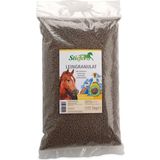 5.0 (7)
5.0 (7)Stiefel Linseed Granules, 5 kg
- Ready-to-feed linseed cake
- High mucilage content
- Reduced fat content due to cold pressing
£17.80 (£3.56 / kg)Delivery by January 19
-
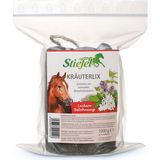 4.8 (10)
4.8 (10)Stiefel Kräuterlix Horse Lick, 1 kg
- Lick stone with bronchial herbs
- A tasty reward
- With attached cord to tie it up
£13.33 (£13.33 / kg)Delivery by January 27
-
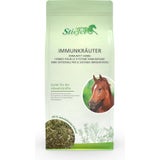 5.0 (8)
5.0 (8)Stiefel Immunity Herbs , 1 kg
New!- 100% natural herbal mixture
- Immunity herbs
- Good for the body's defences
£22.27 (£22.27 / kg)Delivery by January 19
-
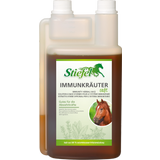 4.8 (6)
4.8 (6)Stiefel Immunity Herbal Liquid, 1 l
Bestseller- To support the immune system
- Made of 100% natural herbs
- No added sugar
£15.12 (£15.12 / l)Delivery by January 19
-
Great Britain: Free standard delivery from £79.90
-
Free
returns Secure payments
with SSL encryption technology

